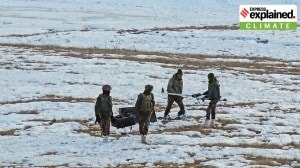We need the truth
There is an air of unreality about the sanctions imposed by the US government on two eminent Indian scientists, who at one time or anot...

There is an air of unreality about the sanctions imposed by the US government on two eminent Indian scientists, who at one time or another were the chairmen and MD of the Nuclear Power Corporation of India, which manages our nuclear power plants, and retired from government service some years ago. One of them had visited Iran since then but only as part of the activities coordinated by the International Atomic Energy Agency. The other scientist has never been to Iran. The ostensible charge under the Iran Non-Proliferation Act 2000 is the supply of nuclear technology and items which have the potential of contributing to developments of weapons of mass destruction. These sanctions raise a number of points that require urgent attention. The most important of them is that we must know the truth.
Both scientists have denied any wrong doing, and their seniority and record demand that their position must be given a respectable hearing and credence. The Department of Atomic Energy, has its own rules and procedures and surely this sort of thing would have been quickly investigated if the US had given some indication or evidence. In any case, the US State Department8217;s claim that the sanctions have been based on 8220;credible information8221; about the scientists having transferred items in violation of US laws would have been more credible if its own intelligence system had even been partly right on its repeatedly asserted claims at the highest levels of Iraq possessing weapons of mass destruction. As happened in the Iraq case, it is possible that interested parties have got together to slap the charge on retired individuals trying to make it generically somewhat similar to the proliferation undertaken by Dr A.Q. Khan.
These sanctions have the potential of slowing down, if not actually derailing, the Next Steps in Strategic Partnership between the two countries. It is not enough for the Indian government to ask the US to review its assessment since no such transfer has taken place. The issue goes well beyond sanctions on two retired individuals who are unlikely to be affected beyond their prospects for travel to the US. This case is far more likely to be used by the non-proliferation hardliners in the US as an example of poor Indian commitment to non-proliferation, strategic literature is going to be recycling half-truths to paint India as a new source of proliferation. What is needed is greater transparency on the issues involved. If, however, there is any substance at all in US claim, then we owe it ourselves to find ways to ensuring such cases do not recur.
- 01
- 02
- 03
- 04
- 05































